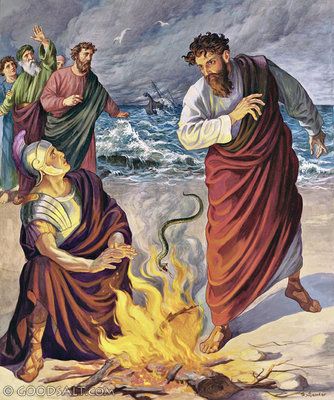“Paul stayed (in Rome)… He welcomed all the people who came
and visited him. He told them about God’s kingdom
and taught them about the Lord Jesus Christ.
He was very bold, and no one tried to stop him from speaking”
(Acts 28:30-31).
The book of Acts shows us the growth of the gospel from Jerusalem to Rome. A central theme of the book is the rejection of the message by the Jews and the acceptance of the gospel by the Gentiles. The standard-bearer in bringing the good news to these new groups was the apostle Paul; that’s why his desire to get to Rome was intense. The path was not easy, but God sustained him, inspired him, and led him.
Thinking about this great man of God, imprisoned in Rome, I get mixed feelings: I feel both sadness and joy. This giant of oratory and teaching spent two whole years under house arrest. How many public addresses he could have made during that time! However, it was during these two years that he wrote his letters to the Ephesians, the Philippians, the Colossians, and Philemon, known as the Prison Epistles.
God always has a pupose for our lives that goes beyond what we can understand and percieve. We cannot have today the audio of Paul’s sermons in during those years, but we have the inspiring letters. Paul the writer went further than Paul the preacher.
I have an enormous admiration for Paul’s boundless passion:
- He is in chains, but preaching.
- The messenger is in jail, but the message is free.
- By the grace of God, he turns his dwelling into a church and his prison into a pulpit.
The biblical record says that he received everyone, preached to them about the Lord’s kingdom, and led them to Christ. Were there restrictions or censorship? No, he did so openly and without hindrance. The gospel was reaching the very heart of the Empire and the world. How can we not admire such dedication and sublime commitment?
What would you do if you were unfairly imprisoned? Would you complain? Would you get depressed? These are all logical reactions, but look at what Paul did: He “was not discouraged. Instead, a note of triumph rings through the letters that he wrote from Rome to the churches” (The Acts of the Apostles, p. 484).
I feel that I can learn from Paul that God is inn control of all that happens to us – that nothing catches Him unaware, and that everything He does or allows has a destiny for eternity.
I feel that, like him, we are all called of God as His messengers, regardless of the situation we are going through.
I feel that I have to learn to look beyond what can be seen.
I feel that I have a duty and honor: to preach and teach about Jesus and His kingdom.
I feel that, by the grace of God…
you can feel the same today!
God bless you, may your purpose in life be revealed to you by God today!










